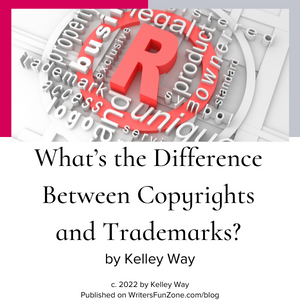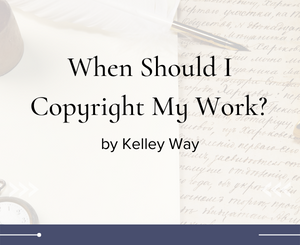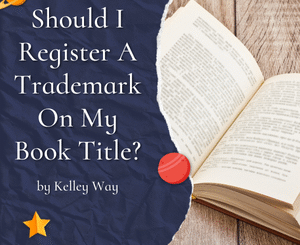What’s the Difference Between Copyrights and Trademarks? by Kelley Way
 Let’s welcome back monthly columnist Kelley Way as she shares with us “What’s the Difference Between Copyrights and Trademarks?” Enjoy!
Let’s welcome back monthly columnist Kelley Way as she shares with us “What’s the Difference Between Copyrights and Trademarks?” Enjoy!
***
When authors contact me for help with copyrights or trademarks, they are often confused or mistaken about which area of law their issue falls under.
For example, they will ask me about:
- copyrighting their company name or book title (that’s trademark law)
- getting a trademark for their book cover (that’s copyright law).
I wrote about this in December, but I thought I’d revisit the topic with a deeper explanation of copyrights and trademarks that applies more specifically to authors. (I also wrote about patents, but since it’s unlikely that a fiction author will need patent protection in relation to their writing, I’m focusing this article on copyrights and trademarks.)
Copyright
Copyright is the area of law that most applies to authors, since that’s what protects your writing.
Copyright law protects creative expression, such as books, art, movies, and music.
As such, it gives several very specific rights to the copyright owner, such as the right to copy (hence the name “copy-right”) that are exclusive to them.
The idea of this law is to promote creativity and creative works and to allow people to profit from their creations.
Since the idea is to promote creativity, only the creative expression can be protected, not the underlying facts or ideas.
For example, if you wrote a biography you could prevent someone from using direct quotes, but you couldn’t stop someone from using the facts about the person’s life.
This is true whether you write fiction, nonfiction, graphic novels or blog articles; all of these are protected under copyright law.
Anyone who wants to copy, sell, translate or quote from your work must get your permission first.
You do not need to register with the Copyright Office in order to have a copyright, though it is a good idea in order to better protect your work.
Trademark
Trademark law protects a seller’s brand in the marketplace.
Anything that serves as a source identifier for goods and services can function as a trademark.
For example, authors can trademark their names, if they’ve achieved a certain recognition in the marketplace. Authors can trademark the title for their book series.
The mark has to be something that is used across multiple products, which is why the title of a single book usually won’t qualify for trademark protection.
To give a concrete example, J.K. Rowling wouldn’t have been able to trademark Harry Potter and the Sorcerer’s Stone when it first came out, but once the second book was published she could secure a trademark for “Harry Potter and …”.
In addition, once Harry Potter became a household name and companies started selling Harry Potter merchandise, the name Harry Potter itself became eligible for trademark protection.
Names are a little harder to trademark, since there are likely several Harry Potters and J.K. Rowlings out there in the world, but if you can show that the marketplace recognizes the name and associates it with you, you can get the registration.
Trademark law prevents two competitors from having trademarks that are similar enough to confuse consumers, and it prevents people from selling knock-offs that consumers think are genuine (to the extent anyone can prevent the selling of knock-offs.)
The idea is to let consumers know who they’re buying from and to allow sellers to build a reputation in the marketplace so consumers want to buy from them.
Like copyright law, you do not have to register your trademark in order to have one, but it is a good idea once you reach a certain level in your career.
What Does This Mean For Me?
Now that you know what copyrights and trademarks are, you may be wondering what to do with that information.
Here are my recommendations. (To be clear, these are recommendations and not legal advice.):
Copyright
If you have a completed or published work, you should register the copyright.
The Copyright Office prefers that you register shortly after publication, but you can register anytime after you consider the work to be complete. (Technically you can register before then too, but why?)
Copyright registration is also (relatively) simple and inexpensive, so there’s no reason not to do so.
Copyright is not required, but there are several benefits that I’ve written about in other articles:
- How Long Does Copyright Last?
- What is Copyright?
- Can I Copyright a Title?
- What Does Copyright Protect?
- To Register or Not to Register Your Copyright
- Why Register a Copyright?.
Trademark
Registering a trademark is probably best left until you’ve achieved some recognition in the marketplace.
Trademark registration is expensive and can be difficult to navigate.
In addition, it’s unlikely someone will deliberately try to infringe on your mark until you’ve reached a certain level of fame.
In the early stages of your career, it’s better to do some research and make sure your intended mark is not already in use, so you don’t infringe on someone else’s trademark, and then focus on building your brand around your mark.
You have some rights without registering your trademark, and those are usually enough for someone just starting out.
Want to Know More?
If you are still confused about the difference between copyrights and trademarks, you are welcome to view my videos on these subjects on my YouTube channel.
If you watch my videos and you still aren’t sure which area applies to your issue, you are welcome to reach out to me at kaway@kawaylaw.com.
***
Want to read more articles like this one Writer’s Fun Zone? Subscribe here.
***
ABOUT THE AUTHOR
Kelley Way was born and raised in Walnut Creek, California. She graduated from UC Davis with a B.A. in English, followed by a Juris Doctorate. Kelley is a member of the California Bar, and an aspiring writer of young adult fantasy novels. More information at kawaylaw.com.







